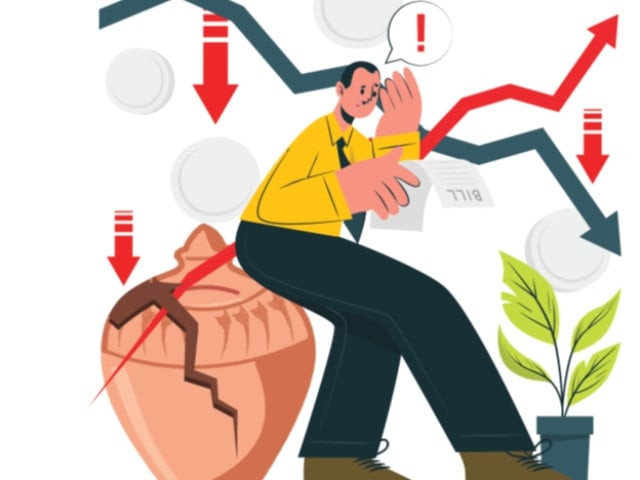Caretakers also leave double-digit inflation
Jan inflation stands high at 28.3%, in line with finance ministry’s projection

Pakistan’s inflation rate slightly moderated to 28.3% in January 2024 but prices in all groups of commodities showed a double-digit rise, an outcome of frequent increases in energy prices to meet conditions of the International Monetary Fund’s (IMF) loan programme and supply disruptions.
The 28.3% inflation was in line with the projection of the Ministry of Finance, which a day earlier significantly raised its old forecast. The interim government too is leaving behind a high inflation as general elections are slated for February 8 after which a new government will take over.
For many years, forecasts of the federal government and the State Bank of Pakistan (SBP) have proved incorrect. Now, price stability is the primary objective of the central bank after it was granted autonomy two years ago under an IMF deal.
Pakistan Bureau of Statistics (PBS) reported a slight moderation in inflation, both in urban and rural areas. But the inflation was still higher than the two-month-old projection, which both the central bank and the finance ministry later revised upwards.
Last month, prices of food and energy items increased further in both rural and urban areas. On the back of an alarming surge of up to 520% in gas prices during the first round, the overall inflation kept soaring across the country. It increased to 30.2% in cities and to 25.7% in rural areas.
Non-food inflation eased to 32.3% in urban areas and to 26.3% in rural areas, though it was still very high. Commodities like wheat flour, rice, tea, sugar, beverages, potatoes and pluses saw a significant increase in their prices last month compared to a year ago.
Food inflation decelerated in both cities and rural areas. In urban centres, it slowed down to 27.4% while in villages and towns, it eased to 25.1%.
People’s purchasing power has taken a hit due to a constant double-digit increase in prices of essential and durable goods. Successive governments have also significantly increased the tax burden, particularly on the salaried class.
The interim government increased prices of electricity and gas under the IMF deal, which kept overall prices high. PBS bulletin showed that gas got expensive by 520% while electricity charges surged 71% in January compared to a year ago.
Read Inflation to stay at 28.5% despite ‘economic stabilisation’
However, the core inflation, which does not include energy and food items, eased to 17.8% in urban areas and 24.6% in rural areas. It is still above the central bank’s policy rate of 22%.
Former SBP Governor Dr Reza Baqir had agreed with the IMF that Pakistan would set the policy rate in line with the general inflation by delinking it from the core indicator. As a result, the central bank has not been able to slash the policy rate despite a slowdown in the core inflation.
This has massively increased the cost of interest payments on loans, which is now more than the federal government’s net income.
There was a double-digit increase in prices of all 12 groups of commodities monitored by the PBS. Prices of food and non-alcoholic beverages went up 25% in January compared to a year ago. Non-perishable goods got dearer by 24% while perishable goods saw a surge of 31%.
The inflation rate for the consumer transport group rose 26% despite a reduction in fuel prices. However, the finance ministry on Thursday announced an increase of Rs13 per litre in the price of petrol while reversing the downward trend.
The government and the central bank are again set to miss their annual inflation target of 21%. PBS reported that for the July-January period of the current fiscal year, the average inflation stood at 28.7%. It was far higher than the official target of 21%.
Average inflation in rural areas was 29.3% for the first seven months whereas it was 28.3% in urban areas. The central bank’s hopes that the inflation rate would dip below 20% on the back a higher reading during the second half of last fiscal year have once again been dashed. The government has also agreed with the IMF on a further increase in gas prices with effect from February.
Published in The Express Tribune, February 2nd, 2024.
Like Business on Facebook, follow @TribuneBiz on Twitter to stay informed and join in the conversation.



















COMMENTS
Comments are moderated and generally will be posted if they are on-topic and not abusive.
For more information, please see our Comments FAQ